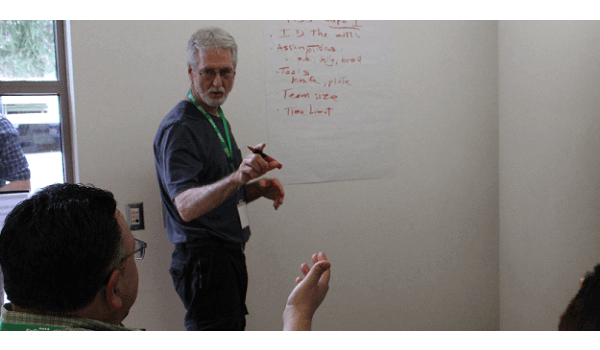
Published in BioSpace
Step into Antioch High School’s senior biotech class, and you will see experiments that use DNA extraction, polymerase chain reaction and gel electrophoresis. At a high-needs school where over 70% of students qualify for free or reduced price lunch, this is not your typical high school lab equipment or techniques. Not your typical low-income high school lab equipment. But that’s par for the course when your high school biology teacher has a PhD in neuroscience and over a decade of lab experience.
David House made the transition from post-doctoral research in Geneva, Switzerland, to inspiring students as a biotech teacher in the San Francisco Bay Area, with the help
of EnCorps STEM Teachers Program. After spending 14 years in research labs, David decided it was time to leave the lab. He explored many options like programming and engineering, but realized teaching would allow him to share his passion for science in a new and meaningful way.
To make the transition to teaching, David relied on EnCorps STEM Teachers Program. He was able to spend a semester in a local high school under the mentorship of earth science teacher, Adam Siegel. His on-the-ground experience was complemented by online training, in-person practical sessions with other STEM-professionals-turned- teachers in the Bay Area, and networking with his cohort of 113 STEM Teaching Fellows across California.
David says, “Teaching students in disadvantaged communities has been a chance to use my background in science to help improve opportunities for kids that really need it. Plus, there’s a new focus on preparing students to understand and solve real-world problems using science and engineering practices. I feel as if having experience in the sciences has been incredibly valuable for connecting students to how science makes a difference in people’s lives.”
With a background in corporate research and product development, EnCorps STEM Teaching Fellow Don Selway found that teaching met his desire to give back. Don teaches biology at SOUL Charter School in San Diego, where his students engage in experiential and project-based learning. He knows that interdisciplinary skills like collaboration and teamwork are priorities for advancing a scientific career. With his unique expertise and experience as a program manager for cell therapy new product development, he connects classroom learning to potential future careers for his students, many of whom had never met anyone from the biotech industry before.
Don says, “EnCorps was amazing in guiding me through the pathway to earn a teaching credential. I’ve made several close friends in my cohort that I call upon when I have challenges in my classroom.”
California-based EnCorps STEM Teachers Program transitions professionals from science, technology, engineering and math (STEM) industries into careers as middle and high school teachers in under-resourced schools. The organization was founded to alleviate the nationwide teacher shortage that disproportionately impacts low income schools, with the ultimate goal to prepare the future STEM workforce with an excellent educational foundation. Statewide Recruitment Director, Bethany Orozco, says “STEM professionals are uniquely positioned to teach in science and math classrooms because students want to know how their education is applicable to their real life. EnCorps Teaching Fellows engage students with stories of their first hand experience in careers like manufacturing, scientific research and programming.
EnCorps Teaching Fellows begin their role by guest teaching in a local classroom with a mentor teacher, where they gain valuable teaching insight, learn to build relationships and inspire adolescents. Fellows engage in online and in-person training, networking and then teach at EnCorps partner schools – both district and charter – across Los Angeles, San Francisco Bay Area, Sacramento, Riverside, North Orange County and San Diego. Since 2007, EnCorps has selected more than 1,000 Teaching Fellows to make the transition. The selection process is rigorous and that number represents about 13% of all applicants.
For professionals considering a career change to teaching, Orozco, a former high school math and science teacher herself, says it can be incredibly rewarding. EnCorps Teachers will, on average, impact over 1,200 students if they teach for just 10 years. The professional development and support EnCorps provides helps teachers meet that milestone. This type of impact can have an exponential effect, and ultimately serves industry by preparing hundreds of students to enter the STEM workforce. Lastly – Orozco says it is most important for prospective EnCorps Teachers to believe that all students can succeed when given the right opportunities, regardless of background.
Even if just one student follows in the footsteps of an EnCorps Fellow, teaching can be an incredibly rewarding career. EnCorps Teacher Julian Lewis not only connects his students to real-world applications of math and science in his aerospace engineering
classroom, but he also inspired one student to pursue an education at his alma mater, Embry Riddle Aeronautical University. A former Lockheed Martin aerospace engineer of 34 years, Lewis grew up in the South Bronx and was inspired by an eighth grade teacher who was a pilot. He says that the satisfaction of working on amazing aircraft equals the satisfaction he gets from watching his students become engaged in aerospace. “At the end of the day, what’s going to be your legacy? What have you impacted? As I share my experience, they are realizing they too can do that. ”
